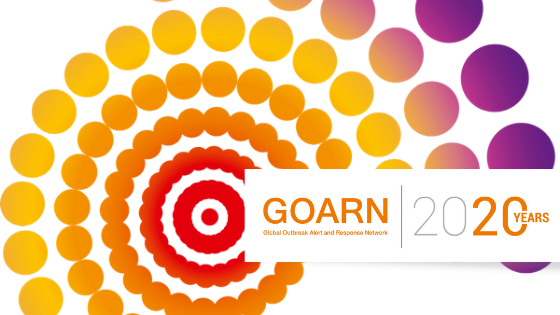
28 April 2020 – The Global Outbreak Alert and Response Network (GOARN) marks its 20th anniversary this year on 28 April 2020. Working closely with WHO and United Nations partners, GOARN stands for saving lives and preventing unnecessary morbidity and mortality owing to the spread of infectious diseases. It has grown from 60 to 250 partners of diverse affiliations and technical backgrounds in the past 20 years. In WHO’s Eastern Mediterranean Region, GOARN has been increasing the value it delivers to the international system of public health as it supports response to acute infectious disease outbreaks.
Over the past 20 years, GOARN has become an essential actor in managing health emergencies, deploying more than 2900 experts to support outbreak needs worldwide. In this Region, GOARN has been coordinating rapid international support teams while providing assistance to countries to investigate and characterize events, assess risks, and strengthen outbreak response. It has also been supporting the capacity-building of national outbreak preparedness and responses.
Broad technical expertise
During major disease outbreaks in the Region, GOARN partners are always ready to rapidly deploy the correct technical expertise and skills when national capacities are overwhelmed and an international response operation is needed. This occurred after the emergence of the Middle East respiratory syndrome coronavirus (MERS-CoV) and the highly pathogenic avian influenza (H5N1), and also after the re-emergence of yellow fever, Rift Valley fever, dengue fever, Crimean–Congo haemorrhagic fever and cholera in the recent past.
In Sudan, six outbreaks related to cholera, dengue, chikungunya, Rift Valley fever, malaria and diphtheria were declared in 2019. GOARN partners deployed a laboratory expert and epidemiologists to strengthen laboratory diagnostic, epidemiological capacities and data management capabilities within the WHO country office, as well as among health authorities.
In Pakistan, over 20 experts were deployed to support one of the largest HIV outbreak investigation and response in Larkana district of Sindh province. These experts provided support in the areas of outbreak investigation, HIV clinical care and support, laboratory diagnostics and support, infection prevention and control, blood safety, and the conduction of a case-control study to identify the source of infection. Five experts were also deployed to support response to the dengue outbreak in the areas of integrated vector control, laboratory diagnostics, case management, and emergency risk communication.
GOARN partners also supported the response to the cholera outbreak in Yemen and Somalia by deploying experts who worked on case management, laboratory diagnostics, oral cholera vaccine campaigns and the electronic Disease Early Warning System (eDEWS).
Responding to a pandemic
In view of the ongoing COVID-19 pandemic, GOARN partners have extended much needed technical support to countries by scaling up response interventions. The Robert Koch Institute has been supporting countries in the Region to strengthen laboratory diagnostic capacities for COVID-19 through training and the provision of kits. The Robert Koch Institute is one of the first GOARN partners to offer technical support to enhance the timely implementation of good quality diagnostic services for the detection of severe acute respiratory syndrome coronavirus 2 (SARS-CoV-2), the virus that causes COVID-19, even under the current challenging conditions of global travel restrictions and shortage of supplies. The United States Centers for Disease Control and Prevention (CDC) deployed epidemiologists to support the COVID-19 Incident Management Support Team in WHO that coordinates response activities and provides technical support to countries of the Region.
In March 2020, WHO undertook a joint technical support mission to Islamic Republic of Iran with two GOARN partners – the Robert Koch Institute and the Chinese Center for Disease Control and Prevention – in response to the COVID-19 outbreak in that country. Team members engaged in detailed discussions and site visits with their Iranian counterparts and were able to share important lessons learned from the early experience with the pandemic in China, Germany and elsewhere. Good progress had already been made in several aspects of the response, and the team was able to advise on further improvements in areas such as epidemiological analysis, laboratory testing, infection prevention and control, and isolation of mild cases. Islamic Republic of Iran remains the country most severely impacted by COVID-19 in the Eastern Mediterranean Region.
Going forward, GOARN is aiming to expand its network in this Region to become a truly multidisciplinary technical response network that will comprise a diverse portfolio of institutions. It will play a more strategic role that will evolve from providing response just during the time of acute emergencies to providing support at the readiness and planning phases of the emergency life cycle.




